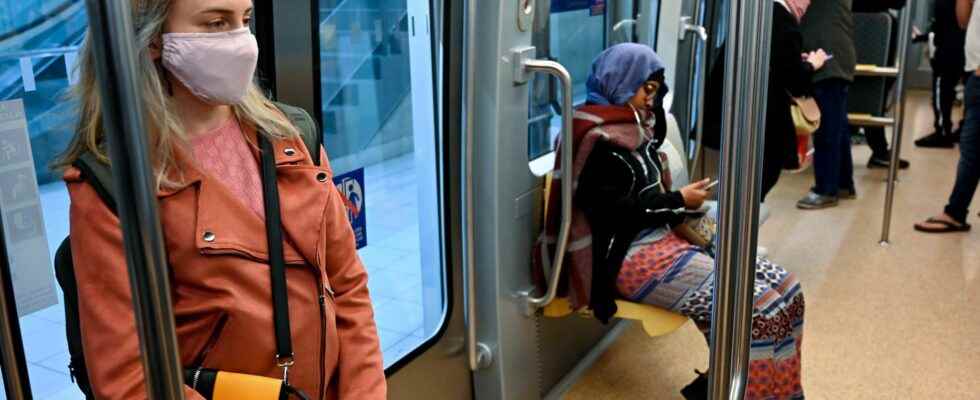Should the wearing of a mask be reimposed in certain places, such as public transport? This delicate question arises again for the executive. Wednesday, December 7, as revealed The Parisian, 12 patient associations have urged the government to impose the mask in transport, pharmacies and crowded stores during this holiday season. “The various calls have very limited effectiveness: it is clear that wearing a mask remains a minority (…) There, it is no longer tenable. Faced with its seriousness and its challenges, our associations are calling for it to be becomes compulsory again in places of great promiscuity”, they write in a forum.
“In public transport, people should wear the mask”, because it is “where there are many of us, in confined spaces, that the Covid-19 is transmitted the most”, for his part affirmed on franceinfo this Thursday Professor Rémi Salomon, president of the Conference of Presidents of the Medical Commission for the establishment of university hospitals, while the number of hospitalizations of infected people continues to increase. “Do you have to force it? It’s not for me to say,” he said, on the other hand.
“The return of the compulsory mask is a political decision and it is not up to us to decide it”, also underlined Brigitte Autran. “But we must move towards wearing a mask as much as possible in closed places, where there is significant promiscuity”, judged the president of the Committee for monitoring and anticipating health risks (Covars).
The regulatory route…
For the moment, the government only wants to be an incentive. But if the figures continue to increase and if it is necessary to decide on an obligation, “my arm will not tremble”, assured the Minister of Health François Braun on BFMTV last Sunday. The means of imposing the obligation to wear a mask in closed places are however quite limited for the government.
Indeed, since August 1, France is no longer under a state of health emergency. The law of July 30 put an end to this exceptional regime which made it possible to take restrictive health measures, in particular confinement, curfew, limitation of movement or even the wearing of a compulsory mask. These measures can no longer be taken without the passing of a new law. Renaissance no longer having an absolute majority in the Assembly, the presidential party could therefore not succeed in having a new law adopted on this thorny subject.
To remedy this situation, a regulatory text would suffice, argued François Braun on BFMTV. “If the house burns, we can issue a decree on the basis of exceptional circumstances, the time necessary to have a vote of Parliament”, also explained to BFMTV a member of the majority. In the event of a strong wave and the start of saturation in the hospital, the government could therefore issue a decree, without asking the opinion of the deputies.
…If the Council of State does not revoke the text
The Prime Minister has regulatory power. The head of government Elisabeth Borne can therefore, in theory, issue a decree to impose a measure. But the government would expose itself to the text being challenged by the Council of State. “When we have administrative police measures that are not strictly circumcised, they incur the annulment by the Council of State because they infringe too much on fundamental freedoms, reports to West France Juliette Alibert, lawyer specializing in health law and fundamental freedoms. A decree restoring the wearing of the compulsory mask would therefore be subject to cancellation because it would not pass the proportionality test.
As franceinfo reminds, it’s all a matter of interpretation. It is necessary to respect “the principle of proportionality”, in other words, the Council of State must ensure that the restrictions do not excessively infringe freedoms. This point therefore largely depends on the health context.
France is currently facing a “triple epidemic”, with the simultaneous circulation of Covid-19, bronchiolitis and influenza, an unprecedented situation whose evolution is still difficult to predict. The flu hits the metropolis early, and bronchiolitis has been at record levels for more than 10 years in infants. This situation hits an already strained health system.
However, the regulatory route is possible at the local level. “Orders issued by prefects or mayors could be justified in a given territory and at certain times of the day, especially in the event of bad epidemiological figures noted locally”, reminds Juliette Alibert to West France. Something to remind the French of the memories of a not so distant period, and not always very pleasant…
